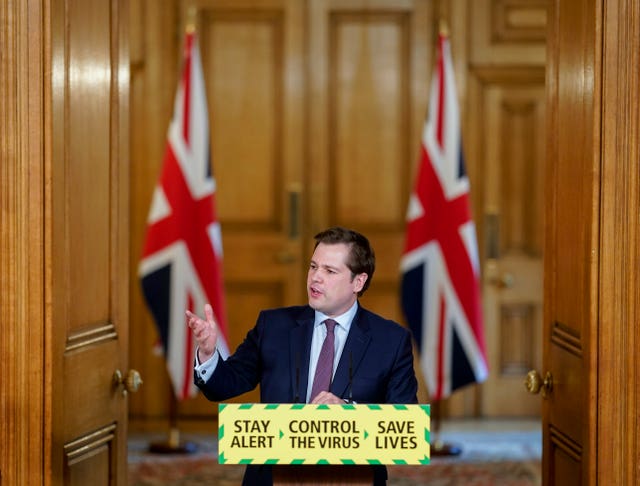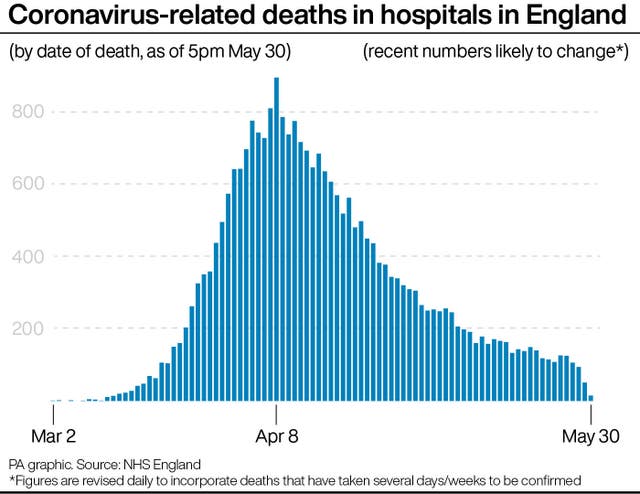
More than two million people who have remained at home for the past 10 weeks due to the coronavirus risk will be able to venture out for the first time from Monday, after guidance to those shielding was updated.
Charities have called for the scientific evidence behind the new Government advice to be set out, saying the timing has created some confusion among a group who, since March, have been repeatedly advised not to go out.
The change was announced late on Saturday and the guidance published late on Sunday, and came in the wake of criticism that the 2.2 million people shielding in England had been forgotten amid the easing of the overall lockdown.
The change in advice sees those considered extremely vulnerable, who were sent letters and advised to stay indoors for three months, now told they can go outside with members of their household while continuing to follow social distancing guidelines.
Those who live alone can meet outside with one other person from another household, ideally the same person each time, also adhering to social distancing guidelines.
The extremely vulnerable category includes organ transplant recipients, people with specific cancers and people on immunosuppression therapies, as well as a number of other groups.
The Government website said the update has been made “taking into account that Covid-19 disease levels are substantially lower now than when shielding was first introduced” and restated that the guidance is “advisory”.
Advice to the clinically extremely vulnerable will be reviewed as part of each review of social distancing measures for the wider population, the Government has said.

The next review of shielding measures will take place in the week beginning June 15, and Communities Secretary Robert Jenrick said depending on how things go, it could become more strict again.
He told the Downing Street briefing on Sunday: “If the conditions become less favourable, our advice to those being asked to shield will unfortunately need to be tightened.”
While cautiously welcoming the slight change in advice, charities said people will want to hear the scientific evidence it is grounded in.
Steven McIntosh, director of policy at Macmillan Cancer Support, said the decision was “a step forward” for a group who “have felt left behind and forgotten” as lockdown is eased for others in England.
Phil Anderson, head of policy at the MS Society, said people would “rightly want to hear a lot more about the scientific evidence showing this will be safe for them”, after a decision which he described as having “come out of the blue”.
SHIELDING THREAD (1/3)
From Monday, the 2.2 million people who’ve been shielding can go outside for first time.
This will be with either members of their household, or, if they live alone, to meet one other person.
Full guidance will follow tomorrow.
— Robert Jenrick (@RobertJenrick) May 30, 2020
Gemma Peters, chief executive of Blood Cancer UK, criticised the Government’s approach, saying: “The way it has announced this on a Saturday night, with no warning or consultation with charities and clinicians, has created confusion, and this adds to the impression already created that the shielding group isn’t high enough on its list of priorities.”
She said the charity is “urgently seeking clarity” from the Government on the advice and added: “Until we get it, we advise people to speak to their healthcare teams before making any changes.”
England’s deputy chief medical officer, Dr Jenny Harries, said the understanding of individual risks with individual diseases is “still a learning process” and cautioned that “nothing will ever be 100% safe”.
Blackpool grandfather Steve Burton said he will see every other person as a potential virus carrier when he leaves his house for the first time on Monday, for a walk to a nearby park with his wife.

The 58-year-old, who is on the transplant waiting list for a kidney, told the PA news agency: “Maybe it’s time that we take that tentative step, but it’s a scary one.”
Dr Harries and Mr Jenrick said they hoped future advice could be more tailored to individuals, rather than the blanket approach taken to date.
Mr Jenrick said the Government’s medical advisers are “producing advice as to how we can give people more specific, tailored advice to their own condition, rather than the blanket approach that we’ve done so far”.
Dr Harries said work is being done to ensure a “new approach” is ready, if there is a second wave of the virus.
Earlier on Sunday Professor Peter Openshaw, who sits on the the New and Emerging Respiratory Virus Threats Advisory Group (Nervtag) to the Government, said future guidance is likely to be more fine-tuned as more becomes known about Covid-19.
UPDATE: People in England who are “clinically extremely vulnerable” to #coronavirus can take initial steps to spend time outdoors from tomorrow
If you are part of this group, find more info here 🔽 https://t.co/orjOAiVIje pic.twitter.com/okCK69Ijwj
— Department of Health and Social Care (@DHSCgovuk) May 31, 2020
Mr Jenrick said the “small changes” being made from Monday will have a “huge impact” on people’s mental health and wellbeing while still ensuring they are protected.
The latest guidance is for England only, but the Government is working closely with the devolved administrations in Scotland, Wales and Northern Ireland, “who will issue their own guidance in due course”, Mr Jenrick said.
The advice not to visit care homes has not changed.
Dr Harries said it is “probably a little bit too early” for a similar move in care settings, given the level of risk involved.
Prime Minister Boris Johnson thanked everyone who had followed the shielding guidance to date and paid tribute to their resilience, and Mr Jenrick reiterated his own thanks on Sunday.


Comments: Our rules
We want our comments to be a lively and valuable part of our community - a place where readers can debate and engage with the most important local issues. The ability to comment on our stories is a privilege, not a right, however, and that privilege may be withdrawn if it is abused or misused.
Please report any comments that break our rules.
Read the rules here